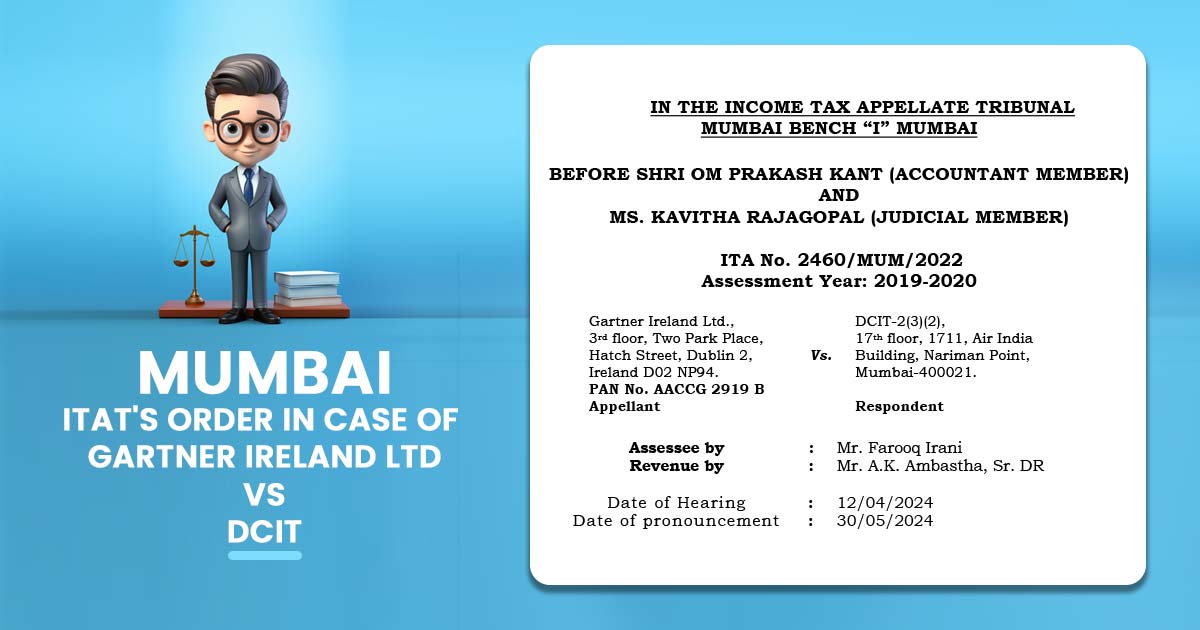
The income from the reselling of subscription-based products is royalty, the Mumbai Bench of Income Tax Appellate Tribunal (ITAT) ruled.
The taxpayer has sold the digital product as well as all copyrights therein, which squarely drops under the definition of ‘royalty’ both under Article 12 of the Double Taxation Avoidance Treaty (DTAA) between India and Ireland and provisions of the Income Tax Act, The bench of Kavitha Rajagopal (Judicial Member) and Om Prakash Kant (Accountant Member) noted.
The taxpayer/petitioner, Gartner Ireland Ltd. (GIL), is a company incorporated in the Republic of Ireland and is a resident of Ireland for tax objectives for Article 4 of the Double Taxation Avoidance Agreement (DTAA) entered into between India and Ireland. The GIL is engaged in the business of selling subscription-based products and corresponding services, i.e., periodicals, reports, and publications that show industry developments and review new products and technologies that deliver independent research and understanding of all characteristics of a business of a company.
There is an amendment in the approach of accessing subscription products by customers as compared to former years. Otherwise, no change is there in the product category. The taxpayer has introduced its subsidiary, i.e., Gartner India Research and Advisory Services Pvt. Ltd., as an intermediary for subscribing to the ‘GIL’ product, and now Indian customers are directed to buy the research product from ‘Gartner India’ rather than ‘GIL’ directly. The taxpayer has entered into a ‘reseller agreement’ with Gartner India.
Electronically the taxpayer has filed an income return declaring a total income of Rs 13,660 including a refund claim. The taxpayer who has furnished the income return was chosen for investigation and legal notices under the Income Tax Act 1961 were issued and adhered to. A draft assessment order was been issued by the assessing officer in which he asked that the revenue generated from the online sale subscription was like ‘royalty’ income to the taxpayer as against the taxpayer’s claim that it was like business income and not levied to tax in India, in absence of any permanent establishment (PE).
Against the order, the taxpayer pleaded for the income via the sale of online subscription-based products, which has been carried via the lower authorities as ‘royalty’ as against the claim of the assessee of the same as ‘business income’, not taxable in India in the absence of any permanent establishment (PE) in India.
The problem was that the income obtained via the taxpayer from Gartner India is assessable to the taxpayer as business income or royalty.
Read Also: Tax Implication Guide on Income of Bloggers Under I-T Act
Taxpayer furnished that the ‘GIL’ sells the products to Gartner India and ‘Gartner India’ only resells these products in India, and therefore the transaction was a pure sale or purchase of the products and, like the business income, not subjected to get taxed in the absence of PE in India under the beneficial provisions of the India-Ireland Tax Treaty.
The department argued that under the definition of royalty under Article 12 of the India-Ireland Tax Treaty, ‘use’ or ‘right to use’ of copyright underlying copyrighted digital products amounts to royalty. The word ‘information’ involving industrial, commercial, or scientific experience covers the matter of the taxpayer as, in the matter of the taxpayer, data has been collected established on past experience in the field of industrial, commercial, or scientific fields; hence, the taxpayer’s matter squarely falls under the description of royalty.
Recommended: ITAT Mumbai: Income Tax Assessments Based Solely on Unverified 3rd-Party Statements Unlawful
The tribunal mentioned that when the sale of digital products the taxpayer is compared with physical products i.e a magazine or a book in the market, it might be similar to that the taxpayer has sold one copy of distinct physical magazines to ‘Gartner India’, then ‘Gartner India’ obtained copies of those printed and sold it multiple times to its customers. It scarcely counts whether the user ID and password for downloading the report have been issued via the taxpayer due to the same has been accomplished on behalf of ‘Gartner India only.
The income obtained via the taxpayer through Gartner India is assessable to the taxpayer as royalty, the tribunal carried.
| Case Title | Gartner Ireland Ltd Vs. DCIT |
| Citation | ITA No. 2460/MUM/2022 |
| Date | 30.05.2024 |
| Assessee by | Mr. Farooq Irani |
| Revenue by | Mr. A.K. Ambastha |
| Mumbai ITAT | Read Order |